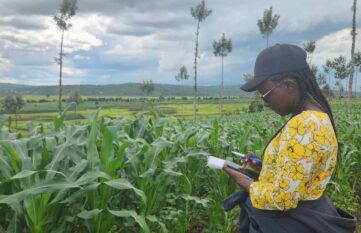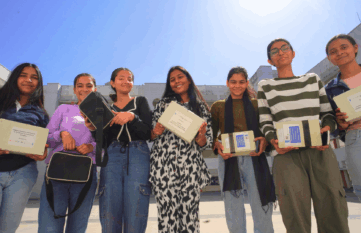New skill unlocked: AI Bootcamp turns barriers into careers

Have you recently used artificial intelligence (AI)? Perhaps to search online, translate, or ask ChatGPT something random? Odds are you have, but if you’re a man, you’re 22 per cent more likely to say yes than a woman. This gender gap is however not the only one in the field. Presently, women make up just 30 per cent of AI professionals globally. Can tech still be the great equalizer?
Responding to this imbalance, the BMZ initiative FAIR Forward – Artificial Intelligence for all, together with Intel, designed the AI and Data Science Bootcamp for Women & Minoritised Groups. This training actively addresses the visible and invisible barriers that women and minoritised groups face in the tech ecosystem and empower them with advanced technical and personal development skills to succeed in a digitally driven economy. The Bootcamp has been implemented in South Africa, Ghana, Rwanda, and most recently Uganda; and received nearly 8,000 applications for only 180 seats overall.
The training was designed to be flexible, with hybrid schedules that consider participants’ work commitments, caregiving duties, and other life responsibilities. In some countries, it provided onsite childcare for participants, transportation, data stipends, and access to laptops, ensuring no one is left behind. To really democratise AI knowledge, the bootcamp focused on people not traditionally in the AI or data science field, opening the door to those with no coding experience and with diverse academic or professional backgrounds.

It was different. You had a sense of community, as these are people like you, with similar struggles. Especially for mothers. They could relate to each other, and it created a sisterhood. We had a new mother on the programme, it was inspiring.
Gontse Moshidi, South Africa
The bootcamp equips participants with practical skills in Python programming for data analysis, data visualization, and foundational machine learning. It also includes modules on data and AI ethics and data feminism, as well as the “AI For Current Workforce Programme” developed by Intel. Participants complete a capstone project, allowing them to apply their newly acquired skills in a real-world context. In addition to technical training, the program offers courses in communication and presentation skills, workplace readiness, and the fundamentals of entrepreneurship.

The skills I gained during the Bootcamp helped me in my master’s programme. My work involves coding and analysing medical data. Hospital administrators provide us with data on diseases and patients, and we must analyse it to provide recommendations. Data is information, and we use coding to interpret it and advise governments. The skills I obtained from the bootcamp are still relevant today. Having the bootcamp experience on my CV and cover letter is impressive and has helped me professionally.
Alice Mbera, Rwanda

After three Bootcamp iterations, FAIR Forward, together with Intel, presents the first Bootcamp Impact Report. 65 per cent of the 180 graduates completed a survey and gave interviews to assess the training’s personal and professional impact. An overview of their answers:
- 83% are applying their new skills in the workplace.
- 73% are now working or studying in AI and data fields.
- 85% report a significant positive impact on their career.
- 97% feel that it improved their personal development.
- 98% indicated an increase in their confidence.
Among those surveyed, full-time employment increased by 34 per cent, while the unemployment rate fell by 27 per cent.
As women, it can be challenging, we have this notion that ‘Oh, tech and coding is for guys, so we cannot find our foot in that space.’ However, thanks to GIZ, it’s changing. And it’s not just about gender, it’s about the value you bring to the table.
Grazia, Ghana
The bootcamp has strongly indicated that the underrepresentation of women and marginalised groups in AI is not due to lack of interest, but systemic and institutional exclusion, that must change to become truly diverse and welcoming.
Further information about this project from FAIR Forward and Intel can be found here: Impact Report


